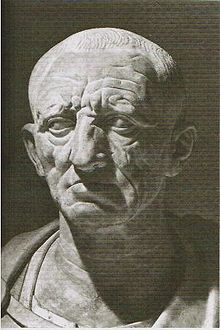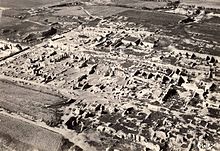- Carthago delenda est
-
 The location of Carthage in North Africa.
The location of Carthage in North Africa.
"Carthago delenda est" (English: "Carthage must be destroyed") or the fuller "Ceterum censeo Carthaginem esse delendam" or "Ceterum autem censeo, Carthaginem esse delendam" (English: "Furthermore, I think Carthage must be destroyed") are Latin political phrases which were popular in the Roman Republic during the latter years of the Punic Wars against Carthage. The city was indeed finally razed by the Romans after the Battle of Carthage in 146 BC, and its entire remaining population sold into slavery.
Although no ancient source gives the phrase exactly as it is usually quoted in modern times (either Carthago delenda est or the fuller Ceterum censeo Carthaginem esse delendam), according to several ancient sources the Roman statesman Cato the Elder would always end his speeches with some variation of this expression even if he had not been discussing Carthage in the speech.[1]
Although the Romans were successful in the first two Punic Wars, as they vied for dominance with the seafaring Phoenician city-state of Carthage in North Africa (modern day Tunisia), they did suffer a number of humiliations and damaging reverses, especially at the Battle of Cannae (216 BC). This grew into an attitude of seeking vengeance and total victory that was expressed with these phrases. The attitude of total warfare toward Carthage resulted in the utter destruction of the city at the end of the Third Punic War and the surviving inhabitants were sold into slavery. The modern legend that the city was sown with salt reflects the perceived savagery of destruction.
The phrase is sometimes adapted in modern usage, in a learned reference to total warfare,[2] The English minister Anthony Ashley Cooper (Earl of Shaftesbury) revived the phrase (rendered as "Delenda est Carthago") in a famous 1673 speech before Parliament during the Third Anglo-Dutch War, comparing England to Rome and the Dutch Republic to Carthage. The phrase has been used as the title for Alan Wilkins' 2007 play on the Third Punic War.[3]
Grammatically, it expresses necessity by using a gerundive with a form of the verb esse, "to be". The fuller form Ceterum censeo … uses the so-called accusative and infinitive for the indirect statement. This construction in Latin is known as the passive periphrastic.
References
- ^ Charles E. Little, "The Authenticity and Form of Cato's Saying 'Carthago Delenda Est,'" Classical Journal 29 (1934), pp. 429-435. The main ancient sources are Plutarch, Cato 27 (δοκεῖ δέ μοι καὶ Καρχηδόνα μὴ εἶναι); Pliny the Elder, NH 15.74; Florus 1.31; Aurelius Victor De viris illustribus 47.8. (The evolution of the phrasing towards its modern form has been further considered in Silvia Thürlemann-Rapperswil, "'Ceterum censeo Carthaginem esse delendam,'" Gymnasium 81 (1974).)
- ^ "Delenda est" shouldn't be destroyed
- ^ Traverse Theatre website
Categories:- Carthage
- Latin political phrases
- Quotations
- Third Punic War
- Genocide
Wikimedia Foundation. 2010.


